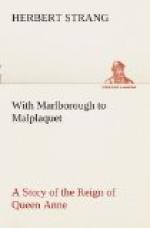The Tories now sought to bring to a close a war that had become so unpopular. Louis XIV was also suing for peace. Then in 1711 the Emperor Joseph died, and his brother the Archduke succeeded him as Charles VI. It was now useless to trouble further to support or oppose the claims of either candidate for the Spanish throne. Spain might as well be in the hands of a Frenchman as be assigned to the powerful Emperor. It would have been absurd, in short, for England to go on fighting for Charles.
The famous treaty of Utrecht, in 1713, brought the war to an end. By this treaty several important matters were settled. Philip retained Spain, but gave up for ever his claim to the throne of France. Louis acknowledged the Hanoverian succession, and gave back to the Dutch the line of “barrier fortresses” about which so much blood had been shed. France gave up to Britain Newfoundland and some other possessions in North America, and Spain resigned Gibraltar and Minorca. The Emperor received Milan, Sardinia, and Naples. The rest of the Allies received little or nothing, and loud was the outcry they raised.
George Fairburn did not remain abroad till the conclusion of peace. During the year 1710, at a time when things were at a standstill in the Netherlands, he received word that his father had been killed in an accident at the pit. With a heavy heart he sought permission to return home for a period, and in pursuing his application he found himself in the presence of the great commander-in-chief himself. To his delight Marlborough recognized him at once. The Duke was full of sympathy, and not only readily granted the young captain any reasonable leave of absence he might desire, but held out his hand with a smile, as he dismissed him: “Major Fairburn, you go with my sympathy and my regard. I have few young fellows under me of whom I think more highly.” And in spite of his terrible bereavement the newly-promoted officer left his master’s presence with a swelling heart.
With him travelled home Matthew Blackett, whose release George, to his delight, had managed, though with difficulty. The gallant Sergeant Oborne had also been exchanged for an English prisoner in French hands. An additional pleasure to both George and Matthew was an intimation that Matthew, too, had been raised to the rank of major in recognition of his excellent service throughout the war. As it proved, neither officer ever served under Marlborough again.
The months flew by. Mr. Fairburn was found to have left a far larger fortune than the world had dreamt of, the sum amounting to fully fifty thousand pounds. George and his ageing mother were rich. Matthew Blackett had taken to the management of the joint collieries, strange to say, and was preparing to leave the army as soon as he could do so conveniently. Major Fairburn, on the other hand, was first and last a soldier, and he hoped some day to have further opportunities of rising in his profession.




